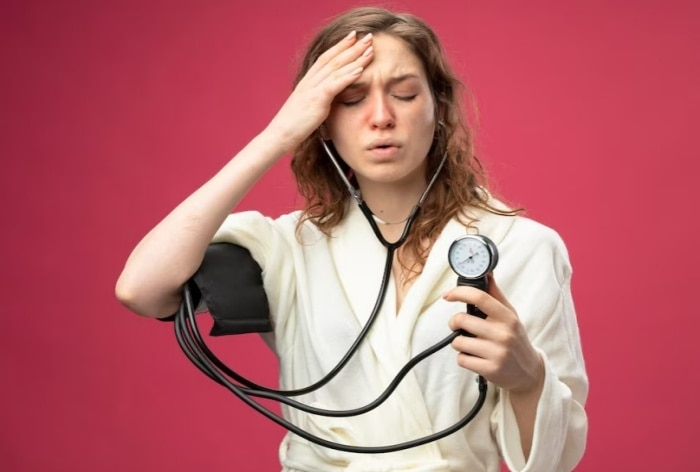High blood pressure can have serious effects on physical and mental health. Experts share deeper insights into its effects.
Hypertension: Stress is a normal reaction of our body to a fight or flight situation. Sometimes too much stress can lead to high blood pressure, but not necessarily. Hypertension or high blood pressure (BP) is a common problem among people today. And most of the time people are not even aware of it. If left untreated, it can become deadly. According to key data from the World Health Organization (WHO) on hypertension, it is one of the leading causes of premature death worldwide. An estimated 1.28 billion adults aged 30 to 79 years worldwide have hypertension, the majority (two-thirds) living in low- and middle-income countries. Additionally, their fact sheet indicated that approximately 46% of adults with hypertension do not know they have the condition.
Blood pressure affects both physical and mental health. It’s also called the ‘silent killer’ for a reason. Before delving into this, one must first understand the basics. What exactly is hypertension and how does it develop?
WHAT IS HYPERTENSION OR HIGH BLOOD PRESSURE?
Hypertension or high blood pressure occurs when blood pressure rises abnormally to undesirable levels. It is the increase in the force that the blood exerts against the walls of the artery. According to Dr. Sunil Wani, Consultant Cardiology at Kokilaben Dhirubhai Ambani Hospital, Mumbai, normal blood pressure is 120/80 mm Hg.
High blood pressure is defined as a level greater than 130/80 mm Hg or 140/90 mm Hg according to various guidelines. Since most of the time there are no noticeable signs of hypertension, it is also called ‘the silent killer’.
symptoms of hypertension
- Headaches: Sometimes these can be brought on by lack of sleep. However, if you get a throbbing headache too often, it could be a sign of high blood pressure.
- nosebleeds: If your nose bleeds not because of sinusitis, then it could be a sign that your blood pressure is high and you need to have your levels checked.
- Difficulty breathing: Difficulty breathing and shortness of breath are also an indication of hypertension.
- Arrhythmia: Arrhythmia or irregular heartbeat can also occur in patients with hypertension. This happens due to the uncontrolled pressure at which the blood exerts force against the walls of the arteries.
- Chest pain: Due to the difficulty in breathing in patients with hypertension, in extreme cases, it could also lead to chest pain.
EFFECTS OF HYPERTENSION
How it affects physical health
BP poses a significant risk of damaging the brain, heart, kidneys, and blood vessels. Ignoring the symptoms of blood pressure can prove fatal and lead to stroke, heart attack including heart failure and kidney failure if not diagnosed early and treated properly.
Accurate measurement in hypertensive people gives a clear picture of cardiovascular risk.
How it affects mental health
Dr. Wani further shared exclusively with india.com that “As people do not control their blood pressure in time, they may experience headaches, dizziness, ability to function normally, etc. All these will lead to mental health, depression or gravity”. from the headache can make the person so irritable and very angry. All of these issues can turn into mental health issues.” Dr. Wani further advises: “Visit your nearest hospital that has full-time availability of specialized physicians for personalized advice and treatment.”
Tips for Accurate BP Measurement
- The correct size blood pressure cuff should be placed on the bare arm.
- It is advisable to have an empty bladder, a full bladder can increase BP readings
- Patients should sit still with back support and feet on the floor.
- Avoid talking while measuring BP readings
- The arm should be supported at the level of the heart.
- Avoid consuming food, caffeine, alcohol 30 minutes before measuring
- If monitoring blood pressure at home, a minimum of three readings should be recorded and the average of the last two readings may be considered for the reading
Although there is no cure, make major lifestyle changes, improve quality of life with a well-balanced diet, limit salt and alcohol intake, exercise regularly to maintain a healthy weight, manage stress, stop smoke, take your medicines correctly and work together with your doctor. These protocols can go a long way and reduce health risks.
Published Date: May 17, 2023 10:50 AM IST
–>
–>
